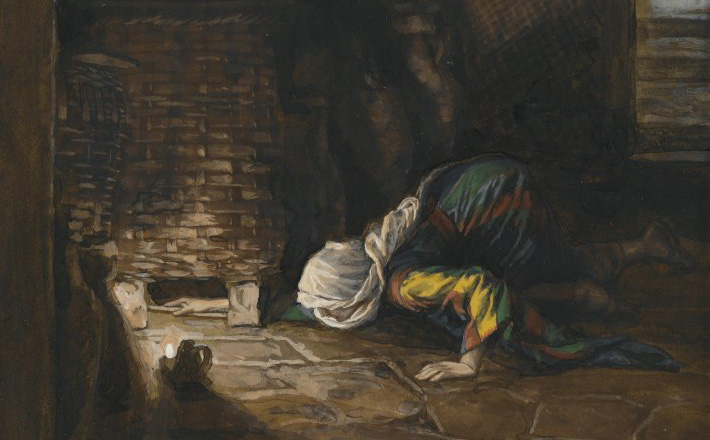Commentary on Exodus 32:7-14
The exchange between the LORD and Moses in Exodus 32:7–14 follows Israel’s greatest moment of failure, the golden calf incident, Israel’s paradigmatic sin.
The people gathered at the foot of Mount Sinai have tired of waiting for Moses to return, and they come to Aaron asking that him to make “gods” to go before them. Aaron complies without argument by making a calf idol of gold, a god of the kind they later will worship in the land of Canaan.
Doubtless the first audience of the book of Exodus would have readily associated this sin with the idolatry practiced in Israel and Judah during the monarchic period, especially with the sin of Jeroboam son of Nebat who established cult centers at Dan and Bethel and placed in each a golden calf idol (1 Kings 12:25–33).
God’s Wrath Burns Hot
The LORD reacts to the people’s sin passionately. They have violated the first and most fundamental of the commandments, the one that binds them to the LORD in a relationship of exclusive loyalty: “You shall have no other gods before me” (Exodus 20:3). Atop the mountain, Moses is unaware of the people’s apostasy.
The LORD knows, however, and commands Moses to descend the mountain immediately to deal with the people. But before Moses has a chance to respond, the LORD passes judgment and announces punishment. The LORD will consume all the people in fire and start over with Moses, if Moses will “let me alone” (verse 10). But Moses will not let the LORD alone.
Moses Reasons with the LORD
Undaunted by the LORD’s wrath, Moses undertakes to save the people. His response suggests that he has heard in the crucial words “let me alone” a possibility, an opening for mercy. And seizing upon this possibility, Moses endeavors to change God’s mind. The LORD’s has effectively disowned the Israelites with the opening line, “Your people, whom you brought up out of the land of Egypt, have acted perversely” (verse 7). Moses will have none of it. Boldly, he reminds the LORD whose people the Israelites truly are: “O LORD, why does your wrath burn hot against your people, whom you brought up out of the land of Egypt” (verse 11).
Looking on from the outside, there is humor in this exchange. It is as if a husband and wife are each attempting to assign responsibility to the other parent for a child’s misbehavior. Moses is more in the right than the LORD on the question of responsibility. The LORD had sworn his promise long ago to Abraham, Isaac and Jacob. Those who have sinned have inherited that promise, so Moses points out that the LORD’s integrity is one the line. So, too, is the LORD’s reputation at stake. If Israel perishes in the wilderness, the Egyptians will say that the LORD’s intentions were evil from the start. Instead of a faith-keeping and merciful deliverer, the LORD will appear to be a faithless, malevolent deity.
The arguments that Moses employs to change God’s mind seem to imply that the LORD is an insecure deity with self-image issues. Is God really worried about what the Egyptians might think and say? Does God need to be forced to remember past promises and oaths? Moreover, the story suggests that Moses is more merciful than the LORD, and this raises questions about the quality of divine mercy. There is no easy way around the unsettling portrayal of God’s character in this text.
Perhaps we should take the simplicity of Moses’ theological assumptions as an indication of either Moses’ or the narrator’s unrefined theology. Or we might view the dialogue as a narrative device for portraying what is in fact a dialogue within God’s own being, with Moses representing the mercy of God and the LORD representing the justice and wrath of God.
God Repents
At the end of the passage, the narrator tells us that Moses’ arguments were effective: “And the LORD changed his mind about the disaster that he planned to bring on his people.” This is a remarkable statement inasmuch as it records the LORD’s reversal baldly and without equivocation. The Hebrew verb translated “changed his mind” is naham, a term elsewhere translated “be sorry” or “repent” when its subject is a human. It is an emotion-laden term and appropriate to a context in which one is deeply moved.
By entering into a covenant relationship with Israel, the LORD risked disappointment and suffering. The Deist God is detached and unmoved — “God the boiling point of water” (A. MacLeish) — but the Bible allows for no such uninvolved view of God. The God of the Bible enters into relationship with humans and thereby into the suffering that love entails.
God Suffers
Our theology is often more shaped by the insistence on divine perfection characteristic of scholastic theology than it is by the Bible. The God of the Bible is not impassible; rather, God is passionately involved with humans. Nor is the God of the Bible omniscient and unchanging. The biblical God freely surrenders Godself to the unpredictable course of events dictated by human freedom and must adjust as history unfolds.
Amazingly, humans can affect God. God changes — acts otherwise –in response to human persuasion. Moses petitions; God reconsiders. Trite and problematic as it may be, the saying “prayer changes things” has more biblical support than “prayer changes us.”
The passionate, persuadable God portrayed in this passage is in accord with “the Crucified God” (Moltmann) of the New Testament. Humans cause God grief and suffering, but God does not withdraw or give up. In costly love God embraces humanity, though pierced in the act. God suffers none to be lost but pursues each wandering lamb, frantically searches for each lost coin. And when the lost turn back, God’s heart is glad.


September 15, 2013